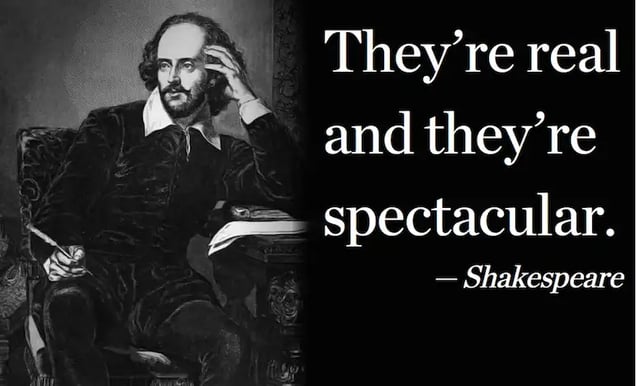Sometimes a lie is better than the truth.

Don’t get me wrong. As a journalist, the Truth is my ultimate boss, constantly wagging its finger at me, reminding me to stay on track. But Truth— and don’t worry, The Truth knows this about himself — can be a bore sometimes.

Wait, Drake died?!
For example, #RIPDrake.
Back in November, someone started a rumor that Drake had died in a car accident. It’s unclear where the lie started, but “patient zero” pushed it on YouTube, Tumblr, BuzzFeed and Twitter.

Three Boob Girl
The there was the infamous Three Boob Girl, Jasmine Tridevil. It would be awesome if this one were true, but it turned out the woman who allegedly got a third breast implant was totally faking it. The boob ended up being a prosthetic she’d secured on her chest with glue or something … gross. After her stunt failed to land her a reality TV slot, she went on to pursue a pop career (briefly) and now appears to be doing some work as a dominatrix, or something.
Obama was almost a jailbird
And don’t forget the widely-shared story from Before It’s News with this thrilling, convincing title: “Judge calls for US Marshalls and the FBI to arrest Congress and President Obama.”
The article said that Obama and everyone in congress was guilty of fraud. And while that might be true in some ways, the article was total bull — about as far from The Truth as you can get.
If life were a parade, The Truth would be the guy watching it, with an average-sized house, a car payment and a few kids. The lies would be the performers in their sparkly sequined costumes, gyrating to loud music. Lies have that element of surprise, glitz and flashiness that make the internet their playground.
Fake “journalists” or writers who don’t fact check are often to blame for spreading these lies.
Here’s a breakdown of how lies spread
Someone says something on the internet. It could come from anywhere. Twitter, Reddit, a blog. Think of that as the first spark.
What they’re saying might be true. It might be something they saw with their own eyes that they think everyone should know. Or it might be a lie cooked up by some malcontent or a bored sad sop with an overactive imagination. Or they might just get it plain wrong.
Take this 2012 Tweet about the flooding of the New York Stock exchange. It was 100% fake.
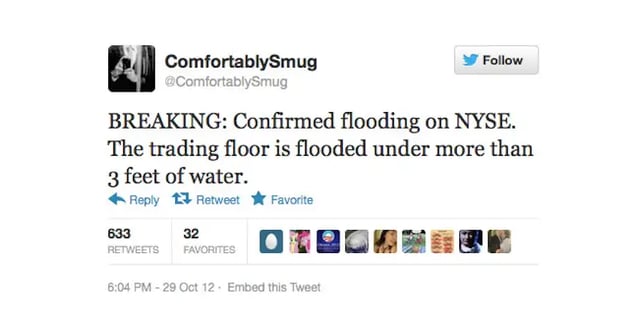
But how does one tweet turn into viral fake news?
I’ll explain.
That Tweet is now out there. Right now some underpaid, overworked writer is sitting in their shitty office somewhere with a half-finished cup of coffee. Let’s call him Jack. Jack has rent to pay and a 5 p.m. deadline. He’s scouring the web for something. That something should be fresh and unbelievable. But he doesn’t have forever to find it.
Jack the “journalist” sees the New York Stock Exchange tweet. It’s unbelievable. It’s the kind of thing that people would talk about with their friends and post on Facebook. It’s exciting.
In the old days, he would have been sent out from his newspaper office to verify the facts. He would have known the fire captain at the station near the New York Stock Exchange, called him up and asked him if the rumors were true. But these days, journalists are sometimes very far removed from the stories they’re writing about. They might never have seen the place they’re talking about. They don’t know the people involved.
So Jack does a little fact checking — maybe too little. Maybe he doesn’t do any. He can’t be absolutely sure it’s true. But when you “break” a story, when you’re first, there’s always the chance of being wrong about something, even though you can pare down this risk considerably by extensive fact checking.
When it comes down to it, journalism is entertainment. If it wasn’t, you wouldn’t have read this far. So Jack, with his deadline approaching and pressure mounting to be first, to say something new — he goes for it. He writes something about what “happened.”
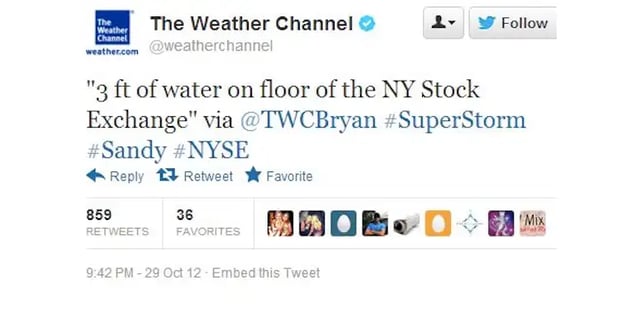
Because the journalist is supposed to work for The Truth, other journalists and readers who see the story believe Jack. They do just what he’d hoped they’d do: their jaws drop, they nudge the person behind them. They repost what he’s written on Facebook and Twitter. Jack is getting a ton of attention. This might be the best day of his career.
Soon, the lie, if it is a lie, is repeated so many times that it seems unquestionably true.
Until someone breaks it to Jack: there was no flooding on the floor of the New York Stock Exchange. Oops.
Politicians lie … a lot.
Randoms on the internet aren’t the only people who lie. Politicians do it too — a lot.
In this case, journalists are usually the only ones who can be relied upon to catch them. They’re also the ones with the platform to shame the public figures into truth telling.
Look at this graph created by the website PolitiFact that appeared in the New York Times:
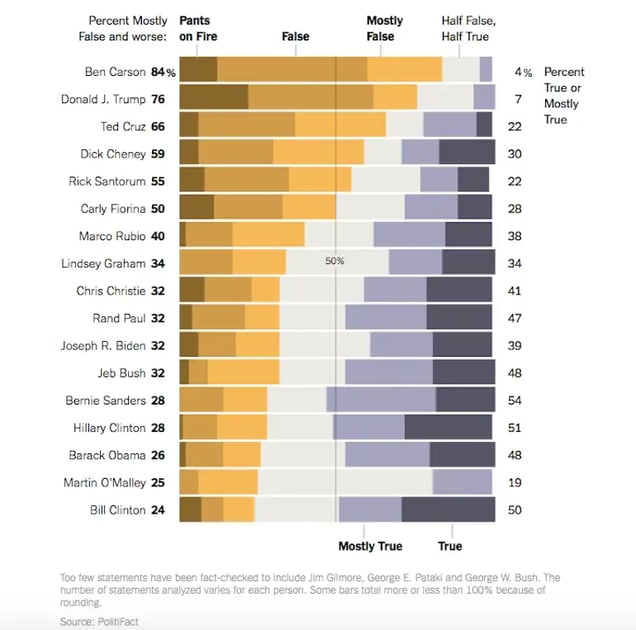
I was shocked to find that more than a quarter of what President Barack Obama says is false. Things are even more bleak on the red side of the spectrum. 76% of what presidential candidate and blowhard tycoon Donald Trump says is somewhere between “mostly false” and “liar, liar, pants on fire.”
Political lies are the most dangerous types of lies.
For example, Trump has said he’d seen videos of “thousands of people” in New Jersey cheering the terrorist attacks on Sept. 11, 2001.
But, as journalist Angie Drobnic Holan pointed out in a New York Times opinion piece, that statement was debunked by journalists. They pointed out the obvious: if what Trump said was true, that video would have surfaced online. But no one has seen it.
With all the vitriol being aimed at Muslims, these kinds of lies put real people at risk of mistreatment and hate crimes.
So, ironically, while the internet can be compared to a tinderbox where sparks turn into wildfires, it’s also the only places where journalists can debunk the falsehoods.
Citizen Journalists can douse lies effectively
That’s what sites like Snopes.com are for — even if they tend to take on lies of a less serious nature. The site was founded in 1995 by a California-based couple with an obsession for folklore and rumors, Barbara and David Mikkelson.
I spent a little time looking through their archives, and discovered some of the bigger myths that have been perpetrated.
The Cookie Dough Bandit story was false:
A woman went into a Walmart in Greenville, North Carolina and attempted to steal some Christmas cookie dough by making it “disappear” in her… eehhhhem. When she was stopped at the door, she took off running, but had to stop when the scuffle caused the dough packaging to pop open, stopping her in her tracks.

That story is a click bait story published by Now8News, a site that only produces fake news. But the rub is that this site isn’t obviously fake. In fact, it’s made to look like a local television outlet. No wonder some people believed the story.
There are many sites like this out there, and others that seem to think it’s fine to riff off the truth with totally ambiguous newsy fiction, the way the site newslo.com does. I’d be fine with it if the sites were clear about what they’re doing. But they’re not.
Look at this image, you literally have a button that allows you to highlight the facts. But if you don’t do that, or overlook the light yellow highlight, there’s simply no way to tell between fact and fiction.
The site’s slogan is, “Just enough news.” Pass the barf bag, please.
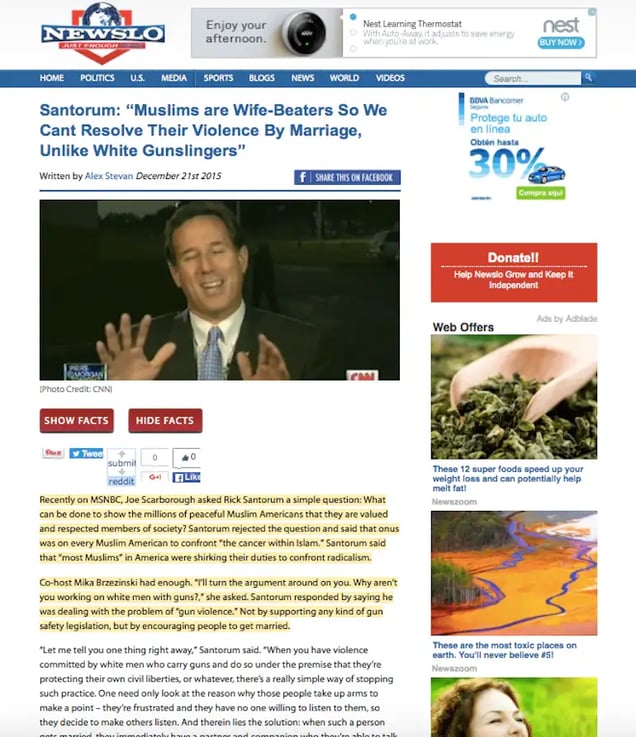
This meme was true:
The statement,“Toddlers have killed more Americans than terrorists in 2015” is 100% true. So far, 21 toddlers shot or killed themselves or others, while 19 Americans have died at the hands of terrorists.
I wonder if Trump’s seen this…
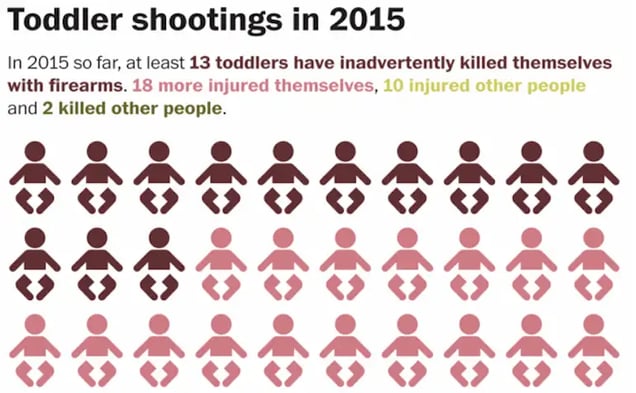
A lot of people can’t tell fake from real
Some people just aren’t internet savvy and when they’re trolling the web, they confuse fake news with the real thing. And it’s not just the hillbillies who get fooled by spoof news. People with power do, too.
Take this story.
After being arrested for his connection to a criminal investigation by the US Justice Department, Jack Warner, the former Vice President of the world’s governing soccer organization, FIFA, defended himself against the corruption charges by using a satirical article from The Onion. He apparently wasn’t aware that The Onion creates satirical fake news.
Here’s the video:
Insinuating that his arrest was a political stunt, the ousted vice president held up an Onion article that said, “FIFA Frantically Announces 2015 Summer World Cup in the United States,” which mockingly suggested that FIFA officials were trying to pander to the US by adding a brand new tournament that would begin that day.
Warner told viewers on his website, Facebook page and YouTube channel, “All this has stemmed from the failed U.S. bid to host the World Cup.”
Why is it so hard to tell lies from truth?
Sometimes, it’s absurdly difficult to tell true from false on the internet.
People are misquoted all the time, fake journalists make shit up, and satire is taken seriously.
It’s part of the reason why journo-comedian John Oliver decided to start his hilarious site, DefinitelyRealQuotes.com which features hilarious misquotes like these:
Yeah, I pronounce it, “pasketti.” Why? Is there another way? -Winston Churchill
They’re real and they’re spectacular.-Shakespear
At least … I think that’s right.
